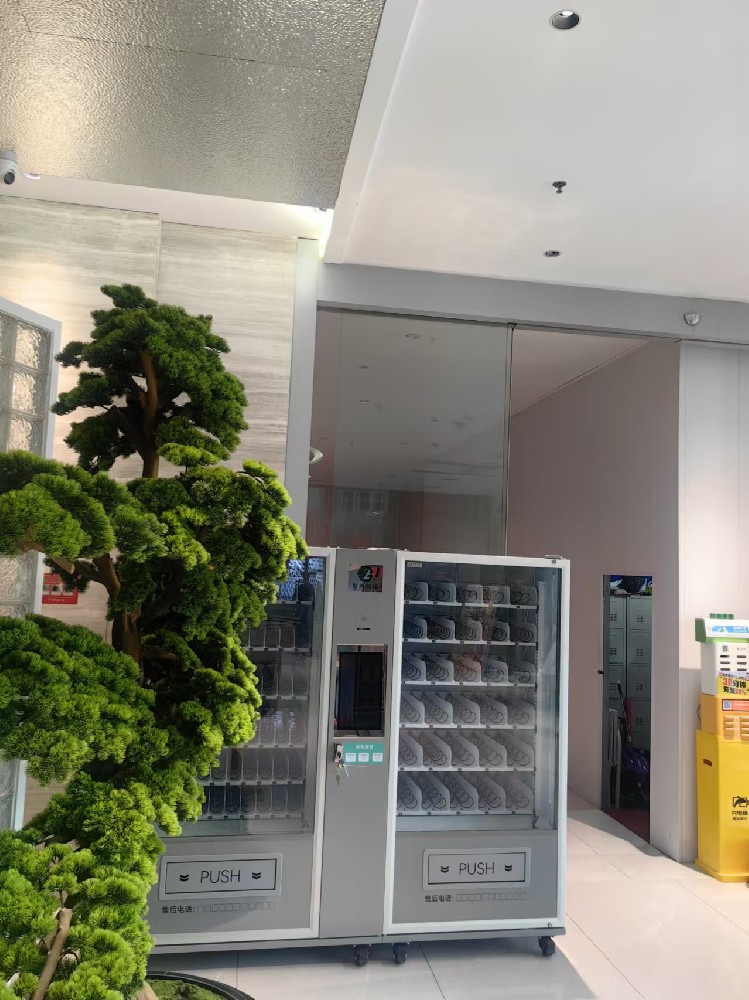In today's digital age, data has become the core driving force behind business success. Zhigou vending machines stand out in the highly competitive retail market by virtue of their acute data insight and outstanding data analysis capabilities, demonstrating extraordinary business wisdom for achieving precise profitability.
I. Data Collection: Building a Comprehensive Information Network
Zhigou vending machines use a variety of advanced technological means to collect a wide range of data related to their business, weaving a comprehensive and meticulous information network. Each vending machine is equipped with intelligent sensors that can monitor the operating status of the equipment in real time, including key parameters such as temperature, humidity, and power, ensuring that the machines are always in the optimal working environment and providing a strong guarantee for the preservation of goods and the stable supply of commodities. Meanwhile, the collection of sales data for goods is meticulous, leaving no details out, from the types, brands, and specifications of goods to information such as the time, location, price of each sale, and the payment method of the purchaser. In addition, by integrating with external data sources, it obtains macro data such as the surrounding population density, consumption level, and consumption habits, as well as real-time information such as weather changes and holiday arrangements, laying a solid foundation for an in-depth understanding of the market environment and consumer behavior.
II. Data Analysis: Unearthing the Treasures Behind the Data
Having vast amounts of data is just the first step. Zhigou vending machines place more emphasis on in-depth data analysis to extract the commercial value contained therein. Advanced data mining algorithms and machine learning models are applied to conduct multi-dimensional analysis of sales data. For example, through association analysis, it figures out which goods are often purchased simultaneously, thus providing a basis for combined sales of goods. With the help of clustering analysis, it identifies differences in purchasing preferences among consumers in different regions and scenarios, so as to adjust the product layout and marketing strategies in a targeted manner. In the analysis of equipment operation data, it can predict possible malfunctions in advance and arrange maintenance and repairs in a timely manner, reducing operating costs. Through comprehensive analysis of macro data and real-time information, it accurately grasps changes in market trends and consumption hotspots and makes preparations in advance for popular goods to seize market opportunities.
III. Precise Product Selection: Meeting Consumers' Individualized Needs
Precise product selection based on data analysis is a key link in the profitability of Zhigou vending machines. Goods types and brands are carefully selected according to the purchasing preferences and demand characteristics of consumers in different regions and different locations. Around schools, stationery, snacks, and beverages popular among students are added; near office buildings, coffee, light meals, and office supplies that meet the needs of office workers are emphasized; at tourist attractions, special souvenirs, local delicacies, and travel necessities are the main offerings. Meanwhile, close attention is paid to market fashion trends and new product launch information, and trendy and popular new products are introduced in a timely manner to attract consumers' attention and stimulate their purchasing desire. By continuously optimizing the product structure, it ensures that the goods in each vending machine can precisely match the needs of local consumers, maximizing sales and improving inventory turnover.
IV. Intelligent Pricing: Balancing Profits and Sales Volume
Price is an important factor influencing consumers' purchasing decisions. Zhigou vending machines use data analysis to achieve intelligent pricing and skillfully balance the relationship between profits and sales volume. First, the costs of goods are accurately calculated, including procurement costs, transportation costs, storage costs, and equipment operating costs, to determine the minimum selling price floor for goods. Then, combined with an analysis of market competition and consumers' price sensitivity, differentiated pricing strategies are formulated for different goods. For goods with unique selling points or less market competition, prices are appropriately raised to obtain higher profits; for goods that are widely known and in fierce competition, a strategy of small profits but large sales volumes is adopted, with prices slightly lower than the market average to attract more consumers. In addition, the prices of goods are dynamically adjusted according to different time periods, seasons, and promotional activities. For example, in office building areas on weekdays, coffee discount packages are offered in the morning and afternoon to stimulate the purchases of office workers; during the peak tourist season at tourist attractions, the prices of special souvenirs are appropriately increased to obtain higher profit returns.
V. Inventory Management: Optimizing Resource Allocation
Efficient inventory management is an important guarantee for Zhigou vending machines to reduce costs and increase profitability, and data plays a crucial role in it. Through real-time analysis of sales data, the sales trends and inventory requirements of goods are accurately predicted, and scientific and reasonable replenishment plans are formulated. This avoids capital occupation and product expiration losses caused by inventory backlogs, while also preventing out-of-stock situations from affecting consumers' purchasing experience and sales performance. Using the inventory management system, inventory goods are classified and managed. Based on factors such as the sales frequency and profit contribution of goods, different inventory strategies are determined. For best-selling goods, an appropriate amount of safety stock is maintained to ensure a continuous supply; for slow-moving goods, sales strategies are adjusted in a timely manner or they are removed from the shelves to optimize the inventory structure. In addition, by establishing a close information sharing mechanism with suppliers, supply chain collaboration is achieved, the replenishment cycle is shortened, and the inventory turnover rate is increased, further reducing inventory costs.
VI. Marketing Promotion: Precise Reach to Target Customers
Zhigou vending machines achieve precise marketing promotion with the help of data analysis, obtaining the maximum marketing effect at the minimum cost. Through the analysis of consumers' purchasing data, detailed customer profiles are constructed, including information such as age, gender, consumption habits, and purchase frequency. Based on customer profiles, personalized marketing plans are formulated, and different promotional information, new product recommendations, and preferential activities are pushed to different types of customers. For example, coffee buy-one-get-one-free coupons are sent to customers who often buy coffee; other local special scenic spots and delicacies are recommended to tourists who have purchased tourist souvenirs. Using the advertising spaces on the screens and bodies of vending machines, precise advertising content is placed according to the characteristics of different locations and target customer groups. Advertisements for school supplies and training institutions are placed in schools; advertisements for office supplies and business services are displayed in office buildings. Meanwhile, through online social media platforms and membership systems, interactions and exchanges are carried out with consumers, feedback is collected, and marketing promotion strategies are further optimized to improve customer satisfaction and loyalty.
VII. Operational Optimization: Continuously Improving Business Efficiency
Data not only plays an important role in the front-end business decisions of Zhigou vending machines but is also indispensable in the back-end operation and management. Through the analysis of operational data, the layout of vending machines is optimized and adjusted. Based on factors such as the flow of people, consumption demand, and competition situation in different regions, the placement locations and numbers of vending machines are reasonably determined to improve the utilization rate of equipment and market coverage. The operation process is continuously optimized. From aspects such as commodity replenishment, equipment maintenance, fund settlement, to customer service, potential problems and improvement space are identified with the help of data analysis to improve operational efficiency and service quality. For example, by analyzing replenishment data, the replenishment routes and time arrangements are optimized to reduce transportation costs and labor costs; by analyzing customer complaint data, the equipment operation interface and service process are improved in a timely manner to enhance the customer experience. Through continuous operational optimization, Zhigou vending machines continuously improve business efficiency and achieve long-term and stable precise profitability.
Under the guidance of data, Zhigou vending machines perfectly integrate business wisdom with advanced technology and keep moving forward on the path of precise profitability. Its successful experience provides valuable references for the entire vending machine industry and even the retail field, demonstrating the infinite potential and broad prospects of data-driven business development.



